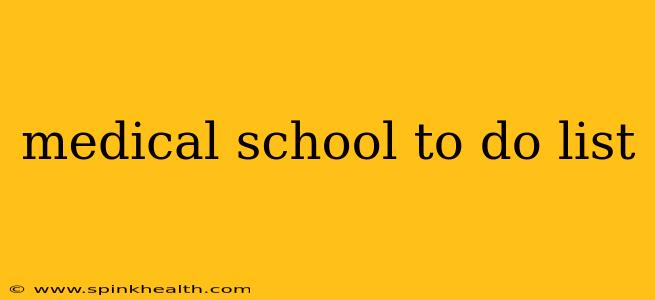The Ultimate Medical School To-Do List: Conquering the Mountain of Med School
Medical school. The very words conjure images of late nights, endless studying, and a constant feeling of being overwhelmed. But amidst the chaos, there's a path to success – a path paved with meticulous planning and unwavering dedication. This isn't just a to-do list; it's a roadmap to navigating the challenging yet rewarding journey of becoming a doctor.
Let's start this adventure by breaking down the essentials, addressing the burning questions many aspiring physicians have, and ultimately equipping you with the tools you need to thrive.
Pre-Medical School Preparations: Laying the Foundation
Before even stepping foot into a medical school lecture hall, there's crucial groundwork to be laid. This phase sets the tone for your entire medical school experience, so don't underestimate its importance.
-
Sharpen your academic skills: Mastering core sciences like biology, chemistry, and physics is paramount. Consider taking advanced courses or seeking extra tutoring if needed. A solid foundation in these subjects will make the transition to medical school significantly easier.
-
MCAT Mastery: The Medical College Admission Test (MCAT) is a major hurdle. Begin preparing early, utilizing practice tests and effective study strategies. Don't just aim to pass; aim to excel.
-
Build your resume: Medical schools look for well-rounded individuals. Engage in extracurricular activities, volunteer work, shadowing experiences, and research opportunities to showcase your commitment and personal qualities.
-
Craft compelling applications: Your application materials, including your personal statement, are your chance to shine. Spend considerable time crafting compelling narratives that highlight your passion for medicine and your suitability for the profession.
During Medical School: Mastering the Curriculum
Medical school is an intense marathon, not a sprint. Effective time management and strategic study habits are crucial.
-
Active Learning Strategies: Passive reading isn't sufficient. Engage with the material actively through note-taking, flashcards, practice questions, and study groups.
-
Mastering the Art of Note-Taking: Develop a system that works for you. Whether it's Cornell notes, mind maps, or digital note-taking, consistency is key.
-
Forming Effective Study Groups: Collaborating with peers can enhance understanding and provide valuable perspectives. Choose reliable study partners who share your commitment to success.
-
Prioritizing Mental and Physical Well-being: Medical school is demanding, but neglecting your well-being is a recipe for burnout. Prioritize sleep, exercise, healthy eating, and stress-management techniques.
Frequently Asked Questions (FAQ): Addressing Common Concerns
How do I balance studying with extracurricular activities in medical school?
This requires careful prioritization and time management. Identify your core priorities and allocate time accordingly. It's about smart work, not just hard work. Learn to say "no" to commitments that compromise your studies.
What resources are available to help me succeed in medical school?
Most medical schools offer a wealth of resources, including tutoring services, academic advising, mental health support, and study skills workshops. Don't hesitate to take advantage of these resources.
How do I deal with the stress and pressure of medical school?
Stress management is critical. Engage in activities you enjoy, practice mindfulness techniques, seek support from friends and family, and utilize the mental health resources provided by your medical school.
What are the best study techniques for medical school?
Different techniques work for different individuals. Experiment to find what suits you best. Active recall, spaced repetition, and interleaving are commonly cited as effective methods.
How do I prepare for medical licensing exams (USMLE or COMLEX)?
Preparation for these exams should be integrated into your studies throughout medical school. Begin early, use high-quality review materials, and practice consistently with simulated exams.
Beyond the Books: The Holistic Physician
Remember, becoming a doctor is about more than just mastering the curriculum. It's about developing empathy, compassion, and effective communication skills. Engage in clinical rotations with enthusiasm, actively listen to your patients, and strive to become a well-rounded and compassionate physician.
This journey is challenging, but it's also immensely rewarding. By following this roadmap and staying dedicated to your goals, you can conquer the mountain of medical school and emerge as a successful and compassionate physician. Good luck!

